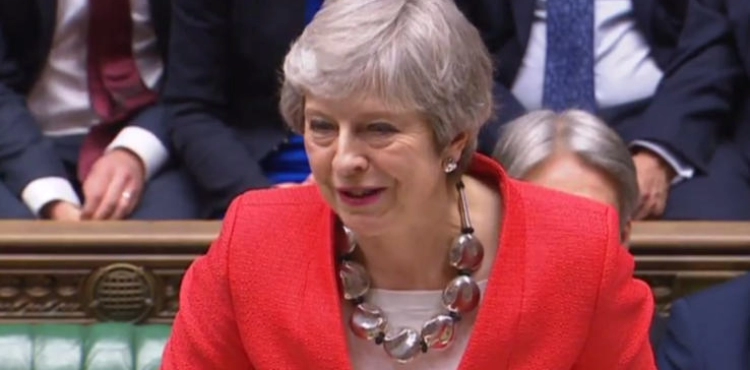Britain´s parliament on Tuesday rejected Britain´s Prime Minister Teresa Mae´s revised exit agreement with the European Union, putting the country in doubt about two weeks before the European Union´s departure date.
Parliament voted against the agreement by 391 to 242.
During the debate, which lasted for several hours, Mai, who was almost unable to speak because of a slap in her voice, called on parliament to vote in favor of the amended agreement. "If this agreement is not accepted, the bricast can go in vain," she said.
"I am sure we have made the best possible changes."
The parliament´s rejection of May´s EU-brokering could lead to economic chaos, as London could then face the possibility of breaking out of a deal with the European Union, its largest trading partner, on March 29 after a 46-year membership. .
But the European Union was quick to confirm its readiness to "consider" a British request for "justified motives" to defer Brikst, said a spokeswoman for the bloc after the British parliament rejected the agreement.
"If the UK makes a reasoned request for extension, the 27 EU members are ready to consider it and take a unanimous decision," said a spokeswoman for European Commission President Jean-Claude Juncker.
In the last attempt to persuade MPs to vote in favor of the deal, May said Britain could "lose Breakst" if voting against the deal.
"For those who really want to achieve BRICEST, they have to realize that if the agreement is not approved tonight, this council risks not achieving BRICCAST at all," she told parliament.
"The danger for us, those who want to achieve BRICAST and to gain the confidence of the British people and to implement what they voted for in the BRICEST referendum, is the loss of BRICAST if the vote is not voted on tonight."
On Monday evening, she went to Strasbourg urgently to extract concessions from European Union leaders in a last-ditch attempt to win the support of the British parliament in one of the most important voting sessions in generations.
The British prime minister said she had obtained "legally binding amendments" to the lawmakers have always asked on the border issue with Ireland.
But British Attorney General Jeffrey Cox said legal caveats at the most controversial point in the 585-page withdrawal agreement agreed upon with the EU were "still the same."
May´s first agreement with Brussels came to a landslide defeat in parliament in January with the anti-Brikst deputies and defenders forming an unexpected coalition.
Brikast´s most vocal opponents oppose a "safety net" plan on the border with Ireland designed to avert renewed sectarian violence in Britain´s Northern Ireland.
They pressed Mae to ensure Britain´s right to withdraw from the plan or limit its duration.
But Brussels considered it necessary to maintain the boundaries of the external bloc after BRICEST.
The Unionist Democratic Party said in a statement that "insufficient progress has been made" calling for a "logical agreement".
The approval of the Democratic Unionist Party was very important to persuade the members of the May party to ease their opposition, or to support the agreement or abstain.
EU leaders have said the offer is the best and the last one Britain can expect.
"There will be no third chance," said European Commission President Jean-Claude Juncker.
German Chancellor Angela Merkel said on Tuesday that the EU had made "clear and broad proposals that take into account Great Britain´s concerns and offer solutions."
The defeat lays at least two new polls in parliament that May has vowed to try to preserve the unity of her divided government.
Parliamentarians will vote in a meeting that is likely to be held Wednesday on the issue of Britain´s exit from the European Union on March 29 without any agreement.
This option is fraught with economic risks and is supported only by the strongest supporters of BRICEST.
If deputies reject the exit scenario without an agreement, Thursday´s vote will be followed by a request for a postponement from the European Union.
The rest of the 27-nation bloc will have to support the postponement unanimously and decide on its duration. EU leaders will hold a summit in Brussels on 21 and 22 March.
Any postponement will have to be short-lived.
"Precast should be completed before the European elections" at the end of May, Juncker said.












